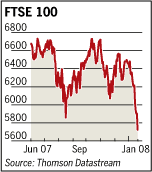European
equities sank on Monday, tracking sharp losses across Asia, after
financial stocks seen as being exposed to the bond insurance market
were stung.
By mid afternoon in London, the main indices were off their worst levels, but still sharply lower. The FTSE Eurofirst 300 was down 3.8 per cent to 1,306.64, Frankfurt’s Xetra Dax shed 5.6 per cent to 6,902.89 . The CAC 40 in Paris lost 4.5 per cent to 4,861.07, and London’s FTSE 100 sagged 3.4 per cent 5,698.8.
The Eurofirst 300 and the CAC 40 were in technical bear-market territory, having fallen more than 20 per cent since their 2007 peaks.
The losses in Europe followed heavy falls in Asia as investors gave US President George W. Bush’s stimulus package a lukewarm response. In Japan, the benchmark Nikkei 225 tumbled 3.9 per cent to a 27-month low of 13,325.94. It has lost a quarter of its value in the past six months.
”Equity markets greeted the news with a resounding thud,” said Sue Trinh at RBC Capital Markets.
Hong Kong’s Hang Seng declined 5.5 per cent to 23,818.86, while Australian stocks extended their losing streak to 11 straight sessions.
Stock markets were also struggling for direction because US markets are closed for a national holiday on Monday, but US equity index futures were sold off steeply.
Conversely, investors sought the safety of government bonds. Prices of German Bunds and UK gilts rose, driving yields lower. The yield on the benchmark 10-year Bund fell 6.8 basis points to 3.91 per cent, while the 10-year UK gilt yield slid 6.7 basis points to 4.4 per cent.
Insurers were among the worst hit stocks in Europe as investors fretted about possible exposure in the sector to monoline insurance – guarantors of bond issues and other debt packages. Monolines were hit last week after ratings agency Fitch cut its debt rating on US bond insurer Ambac.
In Europe, Dexia, which said its US monoline unit FSA had no direct exposure to Ambac, nevertheless fell 6.3 per cent to €14.18 on fears of further downgrades to the sector.
| Date | % change |
|---|---|
| 19/10/1987 | -9.45 |
| 20/10/1987 | -7.82 |
| 16/10/1989 | -6.80 |
| 11/09/2001 | -6.33 |
| 26/10/1987 | -6.21 |
| 15/07/2002 | -5.20 |
| 14/09/2001 | -5.17 |
| 05/10/1992 | -5.07 |
| 19/08/1991 | -4.95 |
| 28/10/1997 | -4.91 |
Jean Pierre Lambert at Keefe, Bruyette & Woods said: “Dexia is fairly exposed to the current crisis with FSA at the top of the securitisation system pyramid.”
Natixis was down 5.6 per cent to €10.67 on fears over its own exposure. The company recently sold its US division CIFG to its controlling shareholders Banque Populaire and Caisse d’Epargne.
In the insurance sector, Germany’s Allianz was down 8.2 per cent to €122.26, Swiss Re fell 7.5 per cent to SFr70.65, France’s Axa shed 7.4 per cent to €22.77, while Zurich Financial fell 6.4 per cent to SFr277.25 and Dutch group ING shed 9.3 per cent to €21.27.
Fears of further writedowns at some of Europe’s most august banking institutions caused heavy losses in the sector.
Germany’s Commerzbank fell 6.7 per cent to €19.66 after Martin Blessing, its incoming chief executive, told Reuters there would be further writedowns to its subprime-linked investments in the fourth quarter, and that more could follow if credit market conditions did not improve.
Rumours of writedowns hit shares of France’s Société Générale. The French bank’s shares lost more than 8 per cent in late trade on Friday as the rumour took hold, and were down a further 7.3 per cent to €79.05 on Monday.
French banks were further undermined by comments from Credit Suisse. Analyst Guillaume Tiberghien, at Credit Suisse, said the broker was ”particularly cautious”.
He added: ”Some risks such as bond insurance and counterparty are hard to quantify but are nonetheless of crucial importance in our view.”
BNP Paribas fell 7.8 per cent to €63.92, while Crédit Agricole shed 7.5 per cent to €18.80.
Those European banks that have already reported writedowns did not escape the carnage. Swiss bank UBS, for example, shed 4.7 per cent to SFr41.12.
Alternative energy stocks continued their sharpc losses, driven lower by fears over demand being hit by a slowdown in global growth.
Norwegian solar panel company Renewable Energy fell 16.2 per cent to €133.25. Having gained 142 per cent in 2007, the stock is now down 50 per cent since the begining of 2008. German rival Q-Cells fell 13.1 per cent to €57.73.
